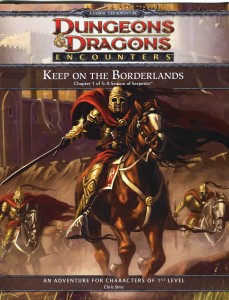While the Dungeon’s Master team enjoys some well-deserved vacation time, we’re breaking out the greatest hits and shining a spotlight on a few of our favourite articles from 2010. We’ve searched for hidden gems that our newer readers might have missed and our long-time readers will enjoy reading again. Enjoy a second look at these greatest hits from Dungeon’s Master.
Until recently I’d never played in a game where a character, let alone an entire party, was willing to accept their own death in order to ensure the accomplishment of the greater good. When Wimwick wrote this article I thought it made for an interesting discussion, but I never expected to ever see it happen during play. After all, you work so hard and so long to earn XP and build up your character that I just couldn’t see anyone willing letting that character die. And then I actually saw it happen. Twice.
The first time I saw this kind of self-sacrifice was as the DM. Our campaign was about to reach its final climax. The PCs were about to complete a quest that spanned 20 levels. However, in order to accomplish their task someone had to sacrifice them self in order to stop a powerful evil from escaping an arcane prison. As the DM I had three important NPCs ready to step in since I knew none of the PCs would willingly make this sacrifice. I was stunned when everyone in the party agreed to do it. I only needed one volunteer, but all the players were willing to give up their PC to accomplish this goal. In the end the Wizard, the PC who had been with the campaign the longest, made the ultimate sacrifice. I never expected any of the players to feel so strongly about the story that they’d be willing to do this, yet they all stepped up. I finally understood what Wimwick was talking about in this article and it was awesome.
The second time I experienced this was as a player in a one-off game. Although we just met these characters and liked them a great deal, it became evident that our mission was too important to fail. We didn’t set out on a suicide mission, but when certain events transpired and we realized that our own mistakes were going to spell failure for the mission we decided to do whatever was necessary to get the job done. In the end that meant a total party kill as we took on a task that we knew we’d never return from. It was one of the most exciting adventures I’d ever played in and even though I’d only played that character once, I’ll always remember him.
If you’re the DM and you make the players care enough about the story then there is always the chance that they’ll make the ultimate sacrifice and embrace the TPK. It’s one thing for a party to face overwhelming odds and get wiped out, it’s an entirely diffident circumstance when the players realize that they’re facing death and do so honourably in order for good to prevail.
